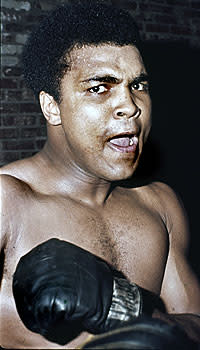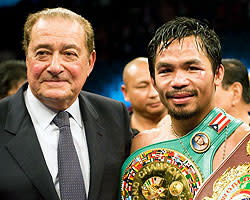Like Ali, Pacquiao's greatness transcends boxing
LAS VEGAS – This is the story of a young man with an incredible gift for boxing, who rose from humble beginnings to become the best, most popular, fighter in the world. He was fast, agile and had an uncanny awareness of what was happening in the ring.
He fought all comers, big and small, and was soon lauded the world over for his magnificent skills.
But as wondrous as his boxing talents were, he transcended the sport and became an international figure because of his work outside of the ring.
Fifty years ago, the story was about Muhammad Ali. Today, it is about Manny Pacquiao.
The men took opposing routes to reach their status. Ali was a controversial and divisive figure whose personal beliefs overshadowed his magnificent boxing ability. Pacquiao's stunning rise through eight weight classes and his ability to defeat men much larger put a microscope on his efforts to aid the people of his homeland.
Top Rank chairman Bob Arum had a front-row seat for each man's rise to world-figure stature. Arum was a lawyer just out of the Kennedy administration when he promoted Ali. He was a Hall of Fame promoter winding down a long career when he promoted Pacquiao.
Though their paths were different, Arum noted that each arrived at the same spot.
"Ali transcended the sport, as we know, because he was a very controversial figure and took stands, some of which were not in accordance with the majority opinion in the public at the time, though they eventually came around," Arum said. "The whole Vietnam War thing. For many people, he was a symbol of the civil rights movement, he was a symbol of the anti-Vietnam feeling and when an athlete really is admired, or even hated, for those positions, he's more than just a great boxer."
Pacquiao, who will fight Shane Mosley on May 7 at the MGM Grand Garden Arena, was barely known by the boxing public, let alone the public at large, when he first fought in the U.S. in 2001. But as his boxing exploits garnered the attention of the fans and media, reporters delved into Pacquiao's incredible rags-to-riches life story.
They discovered a man who had been born into abject poverty who had become the most beloved figure in his country of 92 million. He became rich beyond his wildest dreams, but daily gave his money away to those in need. He was elected to Congress and is championing the construction of a sorely needed hospital in his district while also waging a campaign against human trafficking.
"Manny is loved by people because of who he is and what his story is," Arum said. "People are mesmerized by what is ordinarily a Hollywood, or Bollywood story, an Indian movie like 'Slumdog Millionaire,' where somebody comes from the lowest economic rung, sleeping in the streets, and is able by sheer determination to reach where he has.
"Unlike the general rule, where, if people reach that status, they turn their back on [their past], but he has never turned his back on that. He is legendary for his charitable giving, for his feeling for people, especially for poor people. People connect to that. They really connect to someone like that."
Pacquiao's story has led to an astounding measure of media coverage for a boxer, including a lengthy profile on "60 Minutes." He was on the cover of the Asian edition of Time Magazine and attracts media hordes whenever he appears in public.
On Thursday in Los Angeles, the first stop of a press tour to promote pay-per-view sales of the fight with Mosley, the fire marshal closed the ballroom and wouldn't allow any more media to enter.
On Saturday at the MGM Grand, the second stop of the tour was held and nearly 1,000 fans showed up to see Pacquiao and ask him a question.
His fan base outside of the Philippines now includes persons of every race, religion and nationality.
"It's not just the Filipinos any more," said reporter Nick Giongco of the Manila Bulletin, who has traveled the world covering Pacquiao. "You see now that there are whites, blacks, Hispanics. He crosses all [demographics]."
Pacquiao's trainer, Freddie Roach, has become a celebrity because of his attachment to Pacquiao. He's routinely mobbed while walking around shopping malls in the Philippines, but it extends to boxing mad countries such as Mexico, where Pacquiao has grown in popularity.
Roach was in Mexico recently and threw out the first pitch at a baseball game, largely because of his connection to Pacquiao.
"It would amaze you how much the people in Mexico love him," Roach said.
Arum said he believes Pacquiao will one day become president of the Philippines and said he keeps that goal in mind as he plots Pacquiao's career.
Arum followed Pacquiao on the final days of his successful run for Congress in May and was astounded at the command of the crowd Pacquiao had and the connection he had with the people.
"It's important to me on a personal level because I would have my hand in having somebody as a leader of the country who is not corrupt and will do good for the people," Arum said. "He'll be somebody who can make an impact on the world in general. For me, that's much more important than any nonsense I'm doing in boxing."
Like Ali, Pacquiao has become one of the greatest boxers ever.
But also like Ali, his boxing accomplishments are overshadowed by his social influence and his significance as a world figure.
"I thought Ali was a once-in-a-lifetime character and now, here I am, living it again," Arum said. "It's truly incredible."


